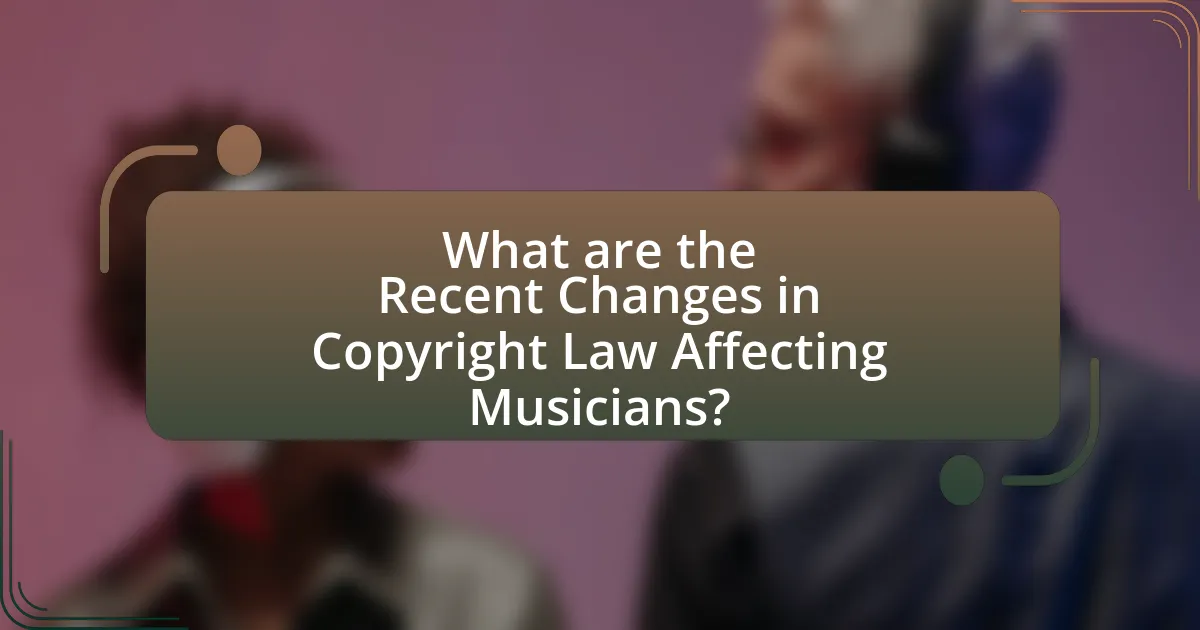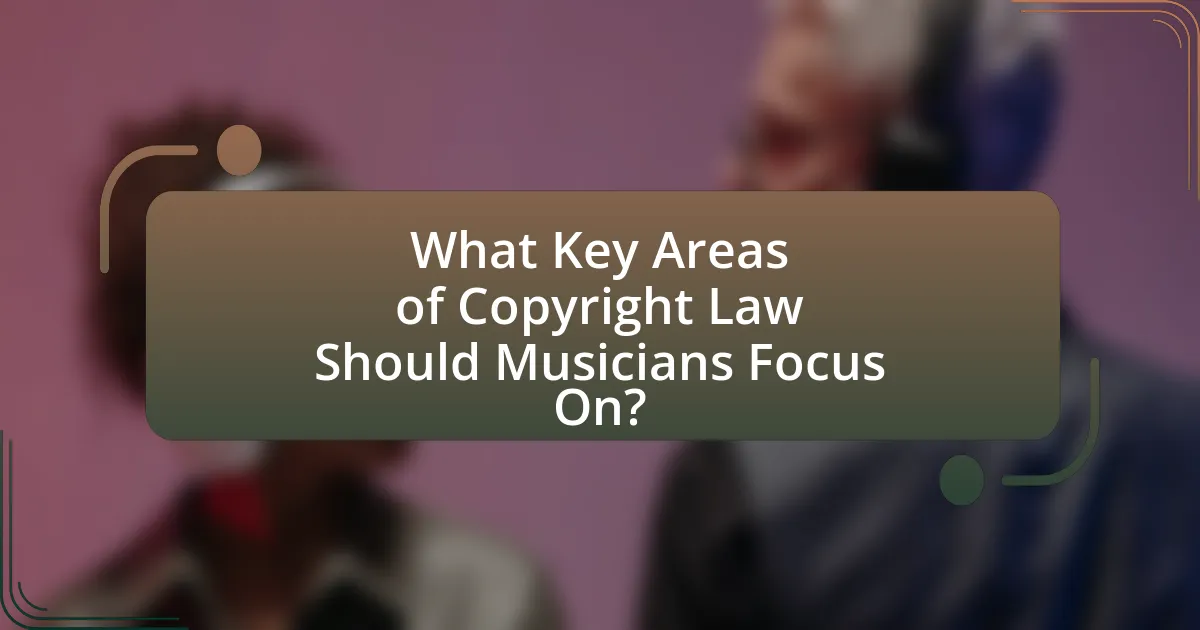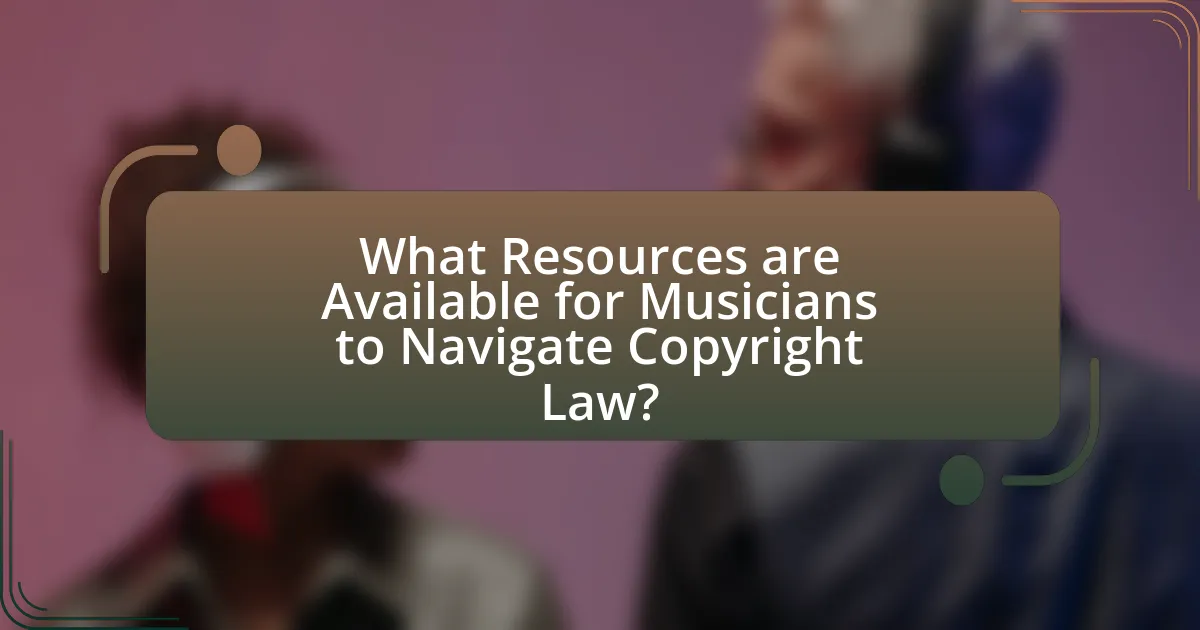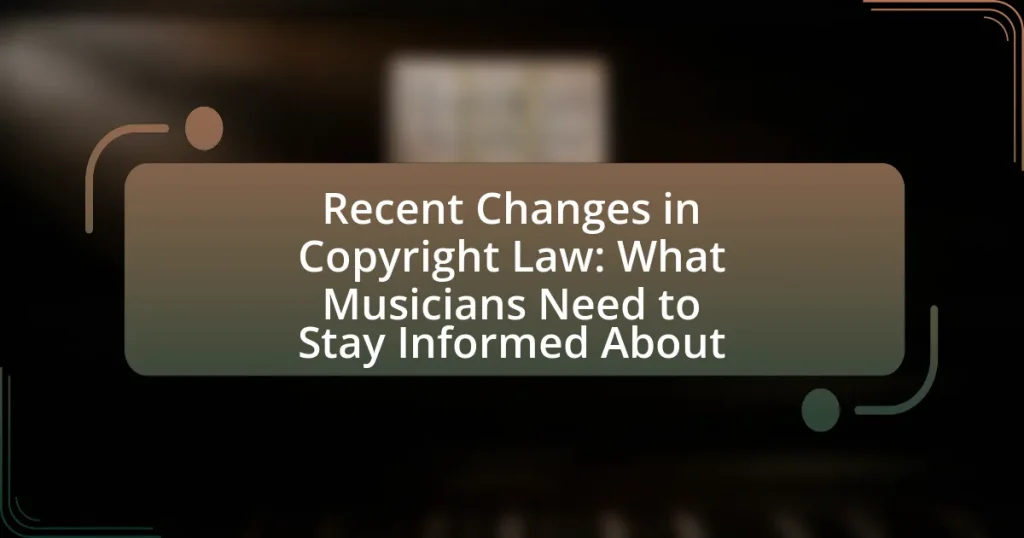The article focuses on recent changes in copyright law that significantly impact musicians, particularly highlighting the Music Modernization Act (MMA) of 2018. Key updates include the establishment of a blanket licensing system for digital music services, improved royalty payments for songwriters, and enhanced protections for intellectual property. The article discusses how these changes affect music distribution, streaming, and the importance of understanding copyright law for fair compensation. Additionally, it outlines essential areas musicians should focus on, such as copyright registration, fair use, and licensing agreements, while providing resources and practical steps for protecting their work.

What are the Recent Changes in Copyright Law Affecting Musicians?
Recent changes in copyright law affecting musicians include the implementation of the Music Modernization Act (MMA) in 2018, which established a new blanket licensing system for digital music services and improved royalty payments for songwriters and producers. This law mandates that streaming services must pay a set percentage of their revenue to songwriters, ensuring fair compensation. Additionally, the MMA created a mechanical licensing collective to streamline the process of obtaining licenses for digital music distribution, thereby enhancing transparency and efficiency in royalty collection. These changes aim to address the evolving landscape of music consumption and ensure that musicians receive equitable remuneration for their work.
How do these changes impact the music industry?
Recent changes in copyright law significantly impact the music industry by altering how artists and producers protect their intellectual property and monetize their work. These changes enhance the ability of musicians to claim royalties and enforce their rights against unauthorized use, thereby potentially increasing their revenue streams. For instance, the Music Modernization Act of 2018 introduced provisions that ensure songwriters receive fair compensation for digital streaming, reflecting a shift towards more equitable payment structures in the industry. This legislative update aims to address the challenges posed by digital platforms, which have historically underpaid creators, thus fostering a more sustainable environment for artists.
What specific aspects of copyright law have been altered?
Recent changes in copyright law have altered the duration of copyright protection, the scope of fair use, and the treatment of digital content. Specifically, the duration of copyright has been extended in some jurisdictions, allowing creators to retain rights for longer periods. The scope of fair use has been clarified, impacting how musicians can use existing works without permission. Additionally, digital content is now subject to stricter regulations regarding distribution and licensing, reflecting the rise of online platforms. These alterations aim to balance the interests of creators and consumers in a rapidly evolving digital landscape.
How do these changes affect music distribution and streaming?
Recent changes in copyright law significantly impact music distribution and streaming by altering how royalties are calculated and distributed to artists. These changes often lead to increased transparency in revenue sharing, ensuring that musicians receive fair compensation for their work. For instance, the Music Modernization Act of 2018 introduced provisions that require streaming services to pay mechanical royalties more accurately, which directly benefits songwriters and composers. Additionally, these legal adjustments encourage more equitable licensing agreements, allowing independent artists greater access to distribution channels and streaming platforms, thereby enhancing their visibility and potential earnings.
Why is it important for musicians to stay informed about copyright law?
It is important for musicians to stay informed about copyright law to protect their creative works and ensure they receive fair compensation for their art. Understanding copyright law allows musicians to navigate the complexities of ownership, licensing, and infringement, which are crucial for maintaining their rights in a rapidly evolving digital landscape. For instance, the U.S. Copyright Office reported that music streaming has significantly changed how artists earn revenue, making it essential for musicians to grasp how these changes affect their rights and income. By being knowledgeable about copyright law, musicians can better safeguard their intellectual property and make informed decisions regarding collaborations, distribution, and monetization of their music.
What risks do musicians face if they are unaware of these changes?
Musicians face significant risks, including potential legal repercussions and financial losses, if they are unaware of recent changes in copyright law. Ignorance of these changes can lead to unintentional infringement of copyright, resulting in lawsuits or penalties that can be financially devastating. For instance, a study by the Copyright Office indicates that musicians who fail to register their works may lose the ability to claim statutory damages or attorney fees in infringement cases. Additionally, not understanding licensing requirements can hinder a musician’s ability to monetize their work effectively, leading to missed opportunities for revenue through streaming, performances, and licensing deals.
How can knowledge of copyright law benefit a musician’s career?
Knowledge of copyright law can significantly benefit a musician’s career by enabling them to protect their creative works and maximize their revenue streams. Understanding copyright allows musicians to secure their rights over original compositions, ensuring they receive proper credit and compensation when their music is used commercially. For instance, musicians who register their works with copyright offices can pursue legal action against unauthorized use, which can deter infringement and enhance their bargaining power in licensing agreements. Additionally, knowledge of copyright law helps musicians navigate complex issues such as sampling, royalties, and distribution rights, ultimately leading to more informed decisions that can enhance their financial success and artistic control in the music industry.

What Key Areas of Copyright Law Should Musicians Focus On?
Musicians should focus on three key areas of copyright law: copyright registration, fair use, and licensing agreements. Copyright registration is crucial as it provides legal protection and the ability to enforce rights against infringement, with the U.S. Copyright Office reporting that registered works are eligible for statutory damages and attorney’s fees in litigation. Fair use is essential for understanding how to use copyrighted material without permission, particularly in transformative works, as established in landmark cases like Campbell v. Acuff-Rose Music, Inc. Licensing agreements are vital for monetizing music, as they dictate how music can be used by others, including synchronization licenses for film and television, which have become increasingly important in the digital age.
What are the implications of copyright ownership for musicians?
Copyright ownership for musicians directly impacts their control over their creative works and potential revenue streams. Musicians who own the copyright to their music can license it for use in various media, receive royalties from sales and performances, and protect their work from unauthorized use. For instance, the U.S. Copyright Act grants musicians exclusive rights to reproduce, distribute, and publicly perform their music, which can lead to significant financial benefits. Additionally, changes in copyright law, such as the Music Modernization Act of 2018, have further clarified and enhanced the rights of musicians regarding digital streaming and mechanical royalties, ensuring they receive fair compensation in the evolving music landscape.
How does copyright ownership affect revenue streams?
Copyright ownership directly influences revenue streams by granting creators exclusive rights to their works, allowing them to monetize through licensing, sales, and royalties. For instance, musicians who own their copyrights can earn income from streaming platforms, public performances, and synchronization licenses in films or commercials. According to the U.S. Copyright Office, music creators can receive performance royalties from organizations like ASCAP and BMI, which distribute funds based on usage. This ownership ensures that artists retain control over their intellectual property, maximizing potential earnings and enabling them to negotiate better deals in the marketplace.
What rights do musicians have under the new copyright laws?
Musicians have the right to control the reproduction, distribution, and public performance of their works under the new copyright laws. These laws enhance protections by extending the duration of copyright, ensuring that musicians receive fair compensation for the use of their music. Additionally, musicians can now benefit from stronger enforcement mechanisms against unauthorized use, which includes the ability to pursue legal action against infringers more effectively. This framework is designed to support the economic interests of musicians in a rapidly evolving digital landscape.
How do licensing agreements change under the new laws?
Licensing agreements are significantly impacted by the new laws, which introduce more stringent requirements for transparency and fair compensation. Under these laws, musicians must receive clearer terms regarding the use of their work, ensuring they are adequately informed about how their music is being utilized and compensated. For instance, the new regulations mandate that all licensing agreements include detailed breakdowns of revenue sharing, which helps artists understand their earnings better. This change aims to protect musicians from exploitative practices and enhance their ability to negotiate favorable terms.
What types of licenses should musicians be aware of?
Musicians should be aware of several types of licenses, including mechanical licenses, synchronization licenses, performance licenses, and master use licenses. Mechanical licenses allow musicians to reproduce and distribute their music, typically for physical formats or digital downloads. Synchronization licenses are required when music is used in audiovisual works, such as films or commercials. Performance licenses are necessary for public performances of music, which can be obtained through performance rights organizations. Master use licenses grant permission to use a specific recording of a song in various media. Understanding these licenses is crucial for musicians to protect their rights and ensure proper compensation for their work.
How can musicians negotiate better licensing terms?
Musicians can negotiate better licensing terms by thoroughly understanding copyright laws and leveraging their market value. Knowledge of recent changes in copyright law, such as the Music Modernization Act of 2018, empowers musicians to assert their rights more effectively. Additionally, musicians should prepare by researching comparable licensing deals within their genre, which provides a benchmark for negotiations. Engaging a knowledgeable attorney or a licensing expert can further enhance their negotiating position by ensuring that all legal aspects are covered and that the terms reflect fair compensation for their work.

What Resources are Available for Musicians to Navigate Copyright Law?
Musicians can access various resources to navigate copyright law, including the U.S. Copyright Office, which provides comprehensive information on copyright registration and protection. Additionally, organizations like the American Society of Composers, Authors, and Publishers (ASCAP) and the Broadcast Music, Inc. (BMI) offer guidance on licensing and royalties. Legal aid clinics and online platforms such as LegalZoom also provide affordable legal advice tailored to musicians. Furthermore, educational resources like the Berklee College of Music’s online courses on copyright law equip musicians with essential knowledge to protect their work. These resources collectively help musicians understand their rights and obligations under copyright law.
What organizations provide support and information on copyright issues?
Organizations that provide support and information on copyright issues include the U.S. Copyright Office, the American Society of Composers, Authors and Publishers (ASCAP), the Broadcast Music, Inc. (BMI), and the Recording Industry Association of America (RIAA). The U.S. Copyright Office offers resources and guidance on copyright registration and law, while ASCAP and BMI assist musicians with performance rights and royalties. The RIAA advocates for the interests of record labels and artists, providing information on copyright enforcement and industry standards. These organizations play a crucial role in educating and supporting musicians regarding copyright matters.
How can musicians access legal advice regarding copyright law?
Musicians can access legal advice regarding copyright law by consulting specialized attorneys or legal services that focus on intellectual property rights. Many law firms offer free consultations or resources specifically for musicians, such as the Music Artists Coalition and the American Bar Association’s Forum on the Entertainment and Sports Industries, which provide guidance on copyright issues. Additionally, musicians can utilize online platforms like LegalZoom or Rocket Lawyer, which offer affordable legal advice tailored to copyright matters. These resources ensure that musicians stay informed about their rights and obligations under current copyright law.
What online tools can help musicians manage their copyrights?
Online tools that can help musicians manage their copyrights include services like TuneCore, ASCAP, and BMI. TuneCore allows musicians to distribute their music while managing copyright registrations and royalties. ASCAP and BMI are performance rights organizations that help musicians collect royalties for public performances of their music. These platforms provide essential resources for copyright management, ensuring that musicians can protect their intellectual property and receive fair compensation for their work.
What practical steps can musicians take to protect their work?
Musicians can protect their work by registering their copyrights with the U.S. Copyright Office, which provides legal evidence of ownership and the ability to sue for infringement. Additionally, they should use contracts when collaborating with others to clearly define ownership rights and usage terms. Musicians can also utilize digital rights management (DRM) tools to control how their music is distributed and accessed online. Furthermore, joining performance rights organizations (PROs) like ASCAP or BMI ensures they receive royalties for public performances of their music. These steps are essential as they help safeguard intellectual property and ensure musicians can enforce their rights effectively.
How can musicians effectively register their copyrights?
Musicians can effectively register their copyrights by submitting an application to the U.S. Copyright Office, which involves completing the appropriate forms, paying the required fees, and providing a copy of the work. The U.S. Copyright Office allows for online registration, which is faster and less expensive than paper submissions. According to the Copyright Office, registering a copyright not only establishes a public record of the work but also provides legal benefits, such as the ability to sue for statutory damages and attorney’s fees in case of infringement.
What best practices should musicians follow to avoid copyright infringement?
Musicians should obtain permission or licenses for any copyrighted material they wish to use, ensuring they respect the rights of original creators. This includes seeking mechanical licenses for cover songs, synchronization licenses for music used in videos, and performance licenses for live performances. Additionally, musicians should create original content and avoid sampling without clearance, as unauthorized sampling can lead to legal disputes. Keeping detailed records of permissions and licenses can also help in demonstrating compliance with copyright laws. According to the U.S. Copyright Office, failure to adhere to these practices can result in significant legal consequences, including fines and loss of rights to their own work.
